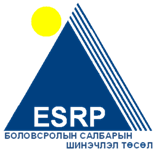Given that ICT has become an influential element creating new avenues for improvement of living conditions and broad opportunities, international community and individual countries have been putting more emphasis on creating conducive policy environment and setting wise investment strategy. Regardless of differences in social and economic development of nations, Information and Communication Technology (ICT) plays an increasingly important role in multiple sphere of human life. However, resulting from many factors, usage and its advantage of ICT is uneven not only between, but also within a particular country.
Especially, it is expected that use of ICT in education determines success in reducing the digital, economic, and social divides and it also has great implications in the process of learning how education sector is managed. Recognizing this great potential of ICT use in education, international donors and developing partners have committed themselves in assisting developing countries to improve accessibility to and utilization of ICT in teaching, learning, and sector management. Since this process consumes sizable investment and efforts of many parties involved develop with high paces, consultation and knowledge sharing with knowledgeable experts and periodical refinement of strategies have become imperative.
Recognizing effective and sustainable application of ICT use in education takes careful assessment of local condition, harmonization with national policy, readiness of teachers and learners as all as potential issues to be tackled, it is especially valuable to share experiences between systems that have commonalities, to learn from successful practices and best achievers for redefining, adjusting and executing national policies, strategies and specific activities.
Symposium Theme
Overarching theme of the symposium is “Transforming Education in Central Asia: Potentials of ICT”. Under this overarching theme, the following two sub-themes are proposed:
ICT for Pedagogy: the first sub-theme will focus on the roles of ICT on improving teaching and learning, with specific attention given to the below 3 aspects.
Access to education
Quality of education
Teacher development
ICT for Management: the second sub-theme will focus on the roles of ICT on improving policy planning and management of the education sector.
Development and Implementation of ICT Master Plans
Using ICT for better planning (e.g., resource projection)
ICT for monitoring and evaluation (e.g., EMIS)
Purpose
To inform major national policy makers of Central and East Asian countries and their development partners on latest practices of ICT utilization in education
Inform and discuss about potential solutions of common issues and challenges faced by education systems of participating countries and implication of using ICT in tackling such issues
Contribute to refinement of ICT policies and practices at national, local and institutional levels
Dates and venue
Ulaanbaatar, Mongolia, 13-14 September 2011
Languages of the Symposium
English with simultaneous Russian Translation
Intended outcomes
Identify policy options and potential solutions of common issues and challenges faced by education systems of participating countries including knowledge input in EMIS building and maintenance, use of ICT for teachers’ professional development and improvement of learning, and creation of digital content
Achieve common understanding about next steps and strategies for improvement
Participants and contributors
Senior officials of Government agencies, 7 representatives of Aimag Education Culture Department Directors, educational institutions, researchers, and development partners (UNESCO, Japan, ADB, World Bank, and relevant NGOs)
Representatives from Mongolia, Kazakhstan, Kyrgyzstan, Uzbekistan, Tajikistan, Turkmenistan and DPRK
Sponsors and Organizers
Government of Mongolia, Ministry of Education, Culture and Science, and Mongolia National Commission for UNESCO
MEXT and JICA, Japan
UNESCO Bangkok Regional Bureau and UNESCO Beijing Office
Mongolian State University of Education
Speakers
Dr. Otgonbayar Yondon, Minister of Education, Culture and Science of Mongolia
Mr. G wang-Jo Kim, Director, UNESCO Bangkok Office
Vice President, Tokyo Institute of Technology
Mr. Asai, Deputy Secretary-General, Japanese National Commission for UNESCO
Mr. Gwang-Chol Chang, UNESCO Bangkok Office
Ms Jongwhi Park, UNESCO Bangkok Office
Mr. Ri Hung Sik, Secretary-General, DPRK National Commission for UNESCO
Mr. Badarch, Director, UNESCO Institute for Information Technologies in Education
Delegation from Kazakhstan
Delegation from Kyrgyzstan
Delegation from Uzbekistan
Delegation from Tajikistan
Delegation from Turkmenistan
13-14 September, 2011
Ulaanbaatar, Mongolia
Organized by:
Ministry of Education, Culture and Science of Mongolia
Tokyo Institute of Technology (Japan)
UNESCO
Mongolian State University of Education


No comments:
Post a Comment